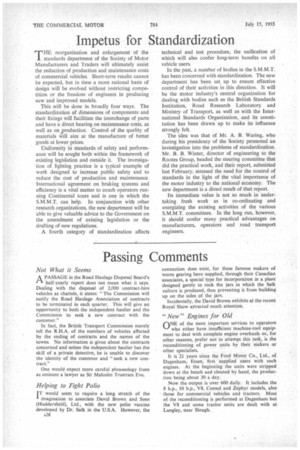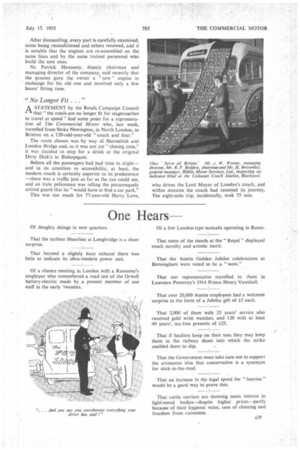Passing Comments
Page 30

Page 31

If you've noticed an error in this article please click here to report it so we can fix it.
Not What it Seems
APASSAGE in the Road Haulage Disposal Board's half-yearly report does not mean what it says. Dealing with the disposal of 2,000 contract-hire vehicles as chattels, it states: "The Commission will notify the Road Haulage Association of contracts. to be terminated in each quarter. This will give an opportunity to both the independent haulier and the Commission to seek a new contract with the customer."
In fact, the British Transport Commission merely tell the R.H.A. of the numbers of vehicles affected by the ending of contracts and the names of the towns. No information is given about the contracts concerned and unless the independent haulier has the skill of a private detective, he is unable to discover the identity of the customer and "seek a new contract."
One would expect more careful phraseology from as eminent a lawyer as Sir Malcolm Trustram Eve.
Helping to Fight Polio
JT would seem to require a long stretch of the imagination to associate David Brown and Sons (Huddersfield), Ltd., with the new polio vaccine developed by Dr. Salk in the U.S.A. However, the
A28 connection does exist, for these famous makers of worm gearing have supplied, through their Canadian associates, a special type for incorporation in a plant designed gently to rock the jars in which the Salk culture is produced, thus preventing it from building up on the sides of the jars.
Incidentally, the David Brown exhibits at the recent Royal Show attracted much attention.
"New" Engines for Old
nNE of the most important services to operators
who either have insufficient machine-tool equipment to deal with complete engine overhauls or, for other reasons, prefer not to attempt this task, is the reconditioning of power units by their makers or other specialists.
It is 21 years since the Ford Motor Co., Ltd., of Dagenham, Essex, first supplied users with such engines. At the beginning the units were stripped down at the bench and cleaned by hand, the production being about 30 a day.
Now the output is over 600 daily. It includes the 8 h.p., 10 h.p., V8, Consul and Zephyr models, also those for commercial vehicles and tractors. Most of the reconditioning is performed at Dagenham but the V8 and some tractor units are dealt with at Langley, near Slough. After dismantling, every part is carefully examined, some being reconditioned and others renewed, and it is notable that the engines are re-assembled on the same lines and by the same trained personnel who build the new ones.
Sir Patrick Hennessy, deputy chairman and managing director of the company, said recently that the process gave the owner a " new " engine in exchange for his old one and involved only a few hours' fitting time.
No Longer Fit . . ."
ASTATEMENT by the Roads Campaign Council that "the roads are no longer fit for stagecoaches to travel at speed" had some point for a representative of The Commercial Motor who, last week, travelled from Stoke Newington, in North London, to Brixton on a 120-odd-year-old "coach and four." The route chosen was by way of Shoreditch and London Bridge and, as it was not yet "closing time," it was decided to stop for a drink at the original Dirty Dick's in Bishopsgate.
Before all the passengers had had time to alight— and in its attention to accessibility, at least, the modem coach is certainly superior to its predecessor —there was a traffic jam as far as the eye could see, and an irate policeman was telling the picturesquely attired guard that he "would have to find a car park."
This was too much for 77-year-old Harry Love, who drives the Lord Mayor of London's coach, and within minutes the coach had resumed its journey. The eight-mile trip, incidentally, took 75 min,




























































































